Hi! Umm Pls Pls PLS If You Have The Time, Do A Thingy On Arms When You Get The Chance, They Are So Hard
hi! umm pls pls PLS if you have the time, do a thingy on arms when you get the chance, they are so hard i could almost cry aslkdjaskjsas, i keep forgetting how many curves an arm should have/how long it should be (in diff positions/when it's not resting at the hips) etc etc etc ahhh omg please!! thank you sosososo much, i l♡ve all of your art and i hope you have a nice day!! ✧ ㅠㅠ ✧






I don’t want to go into detail in terms of muscles, but I’m sure you can find them if you google arm muscles! Hope this helps u out a little!
More Posts from Aether1984 and Others
a funky test for character design
draw all your poc characters in black and white, without greytones, and check if they’re still recognizable as poc.
if they look completely fucking indistinguishable from your white characters then u should work that
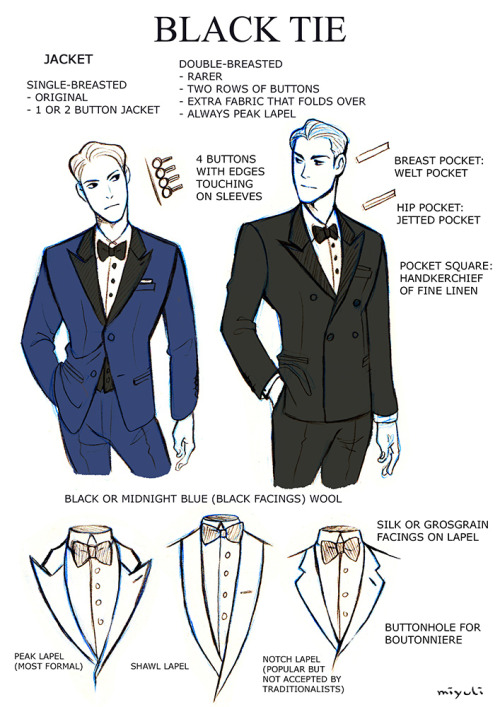
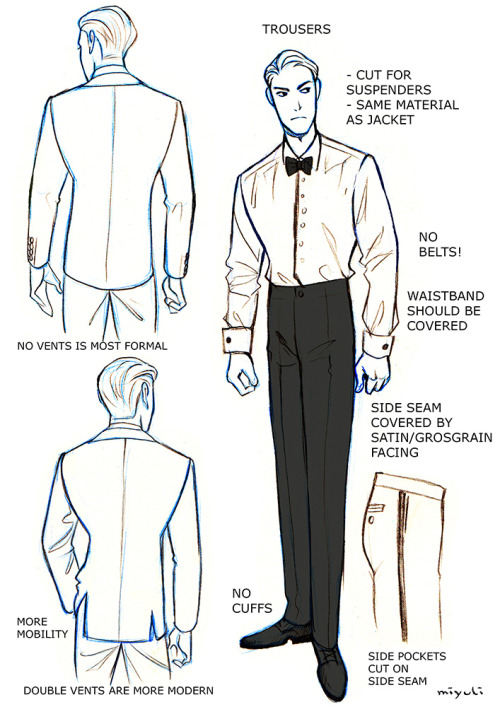
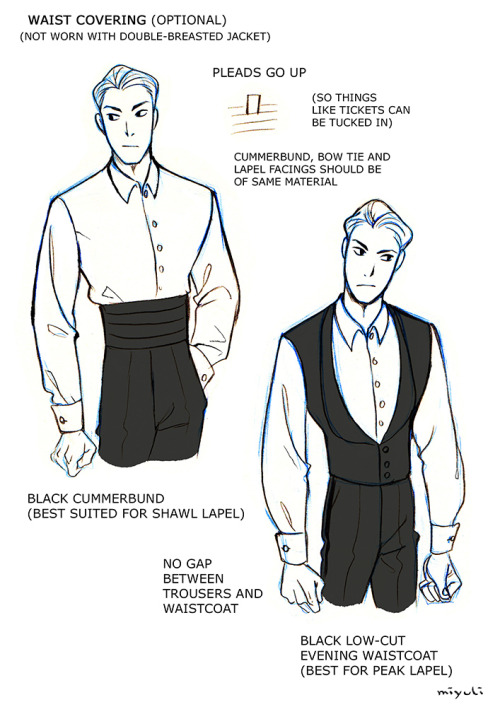
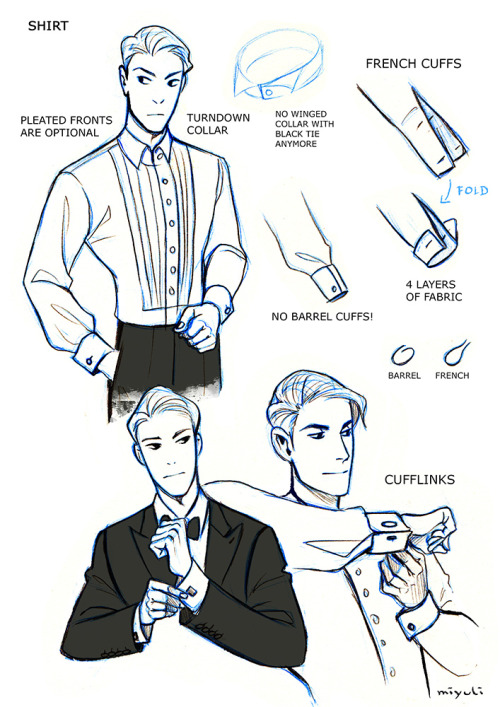
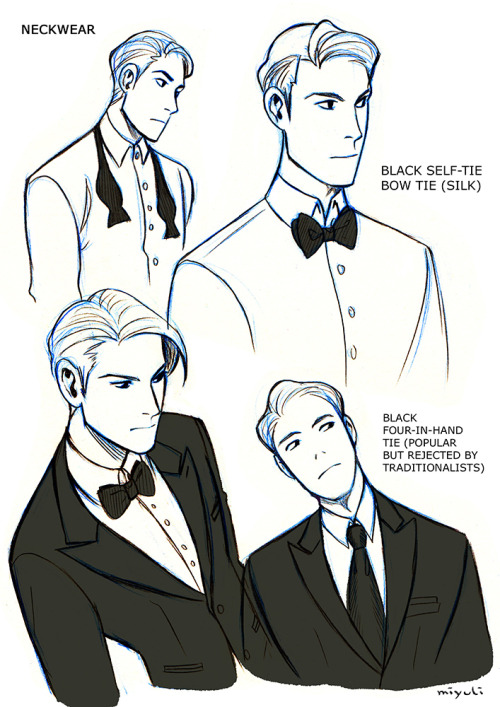
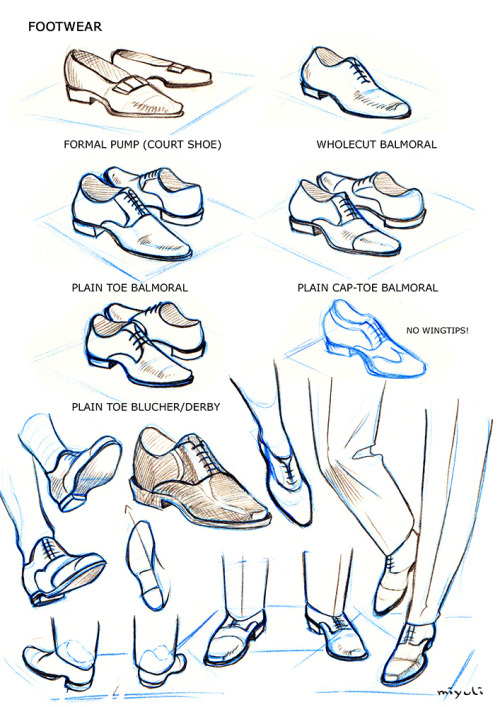
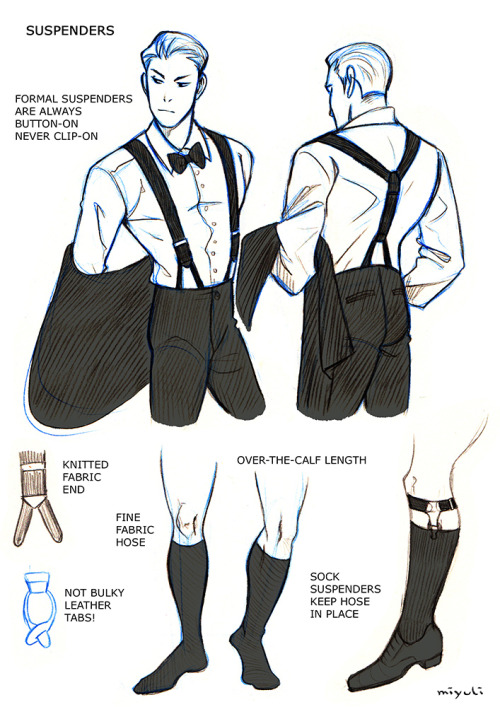
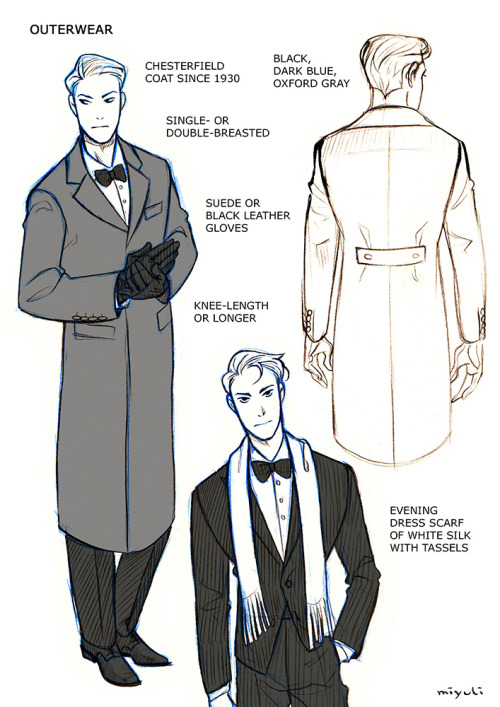
I’ve been studying the classic black tie dress code (mainly from here) so I thought I could share my notes. Maybe they can be helpful to someone else, too. If I made any mistakes or things are really confusing please tell me. I also have some notes on white tie which I could share as well…
Horns and Antlers
took a while, but i'm mostly back on my feet and have energy again.
I received an ask a while ago about how to add horns and antlers onto a humanoid, so here are my thoughts on that:

(image description: a stock image of the human skull from four angles, front, back, side, and three quarters. Next to it, the same image faded and traced over in blue, with red circles all around the top front portion of the skull. A note on the image says, "there are lots of places you can anchor horns or antlers". end description.)
Here I have marked out some common placements for horns/antlers, and I will show them each in more detail below. The four main areas are: the brow, the center forehead, the top, and the sides of the skull.
As a general rule, horns and antler anchor directly to the skull, but they do not emerge from the skin as solid bone. There is typically a covering layer of some sort, like a keratin sheath, that starts where the horn or antler emerges from the skin. This makes horns and antlers look a bit funny when you remove the skin, because the actual bone base is thinner than the covering layer.




(Image description: same as before, with the four angles of the human skull next to traced versions of it. This time, each of the four images shows the skull with simple horns added and the skull altered to accommodate them in the four basic horn positions. Brow, sides, top, and center forehead. end description.)
Depending on the size of the horns or antlers, you may want to add more bone to the skull, or even thicken the neck bones. Bigger neck and shoulder muscles will also be important to keep the head upright with the additional weight. For horns at the brow and forehead, I've made the brow bone bigger, and for horns at the top and sides, I've made the skull a bit wider and thicker in those areas. It isn't a huge difference, and may not even be very visible on a skin layer, but it's important to be aware of.
And now I also have four sketches of how each horn/antler location would look on a person with the skin and hair in place.

(image description: four simple sketches of people from the shoulders up, in basic shaded colors. From the top left, clockwise:
A man with a mohawk and short beard, frowning. He has curved horns over his brow. A woman with long braided hair and a neutral expression. She has a single horn in the center of her forehead. A man with a beard and long unkempt hair, looking tired but happy. He has moose-like antlers on the sides of his head. An androgynous person with short hair, smiling. They have pronghorn antlers at the top of their head. end description.)
It's very easy on the sides and top of the head to cover the base of the horns/antlers by layering the hair around them. But any horns on the forehead area will be harder to cover this way. I've put thicker skin where the horns and antlers emerge, which has made the brow very heavy on the first two sketches. To balance that out, I also made their nose bridges a bit bigger and more connected to the forehead.
So I hope that helps! Horns and antlers are very fun, and they come in so many shapes.
do you have a reference/tutorial for the way you draw teeth??


I kinda just freehand it myself since i got it memorized but i made one for ya- i hope it’s alright;;v;!!
A Tutorial Masterpost
I said that I’d show some tutorials I have saved up to someone, but decided that I’d just go ahead and post most of what I have stored away and create a sort of masterpost out of it. (I figure it’ll help me just as much since, as of now, they’re all pretty scattered between my Tumblr and bookmarks)
A lot of these are hosted on my personal Tumblr, but I don’t change my url so it’s pretty safe to bookmark them there (and not have to worry about the url changing) if you don’t wish to reblog them yourself for whatever reason.
Feline tutorials:
Basic domesticated cat tutorial
The domestic cat body
Improving upon (lion) anatomy
Realistic lion faces tips
Big cat paw tips
Canine vs. feline - paws and legs
Beginner feline tutorial
Guide to big cats
Feline comparison
Canine vs. feline - facial anatomy
Canine vs. feline - chest anatomy
Guide to little cats
Big cat eyes (could work for other eyes)
Canine tutorials:
Basic wolf anatomy
Skeleton notes on wolf legs
The wolf skeleton as a whole
The wolf skull and teeth
Wolf paw tips
Basic canine poses
Canine ears and chest
Drawing realistic wolves
Basic wolf tutorial
Wolf paw tutorial
Paw pad tips
Wolf skeleton and muscles
Wolf fur direction
Canine vs. feline - paws and legs
Canine vs. feline - facial anatomy
Canine vs. feline - chest anatomy
And this is just an excellent DA for wolf reference images
Avian tutorials:
Bird wing anatomy applied on humanoids
Bird wing tutorial (lots of underrated tips)
Varying bird wing structure
Basic owl anatomy
Bird wing vs. bat wing vs. pterodactyl wing vs. human arm
Bird wings and flight
Various bird wings
Human(oid) tutorials:
Hand tips and reference
Simplifying human anatomy
Feet and shoes tutorial
Bird wing anatomy applied on humanoids
A guide to movement: flexibility
A male shoulder study
Altalamatox face tutorial
Male legs reference
The human hand
Male vs. female waist
Excellent expressions tut
Understanding anatomy part 1 (follow desc. links for more)
Painting skin
Simplifying hands
More simplified hands
Pose tutorial
Varying the female figure
Profile proportions
Expression tutorial
Virtual lighting studio
Breaking up the male torso
Male torso anatomy in use
Simplifying the human foot
Various facial and body shapes reference
Drawing the nose
Female anatomy patterns
Human mouths
Breaking down the human nose
How to draw the ear
More hand(y) tips
Neck and torso tut
Jawline and kissing tip
Yet another hands tutorial
Male torso in motion
The human head at various angles
Variation of colour throughout the skin
Excellent action and couple references
Advice on eyes
Feet reference drawings
Nose shapes
The human skull and face
Facial features
Portrait lighting cheat sheet
Animating dialogue (mouth movement)
A kissing tutorial
The fist
Various athletic builds
Various types of hair
Proportional height of different positions
Expressions photo references
The hand in motion
Skintone palettes
Semi-realistic eye tutorial
Male muscle reference
The human body in perspective
The human head at various angles
Painting a realistic eye
Arm shape and muscles
Animal feet on a human figure
Hand poses
The face in profile
Skin tutorial
Body type diversity
Drawing hair
Muscles in the neck and face
A beginner’s guide to knees
Another ladies tutorial
Breakdown of lips
Blocked out human faces
Practice figure drawing (animals as well)
A neat arm trick
Excellent ear anatomy tutorial
Fullbody proportions tutorial
Over the shoulder poses
Male torso photo reference
Detailed arm muscle drawings
Guide to human types
Dragon tutorials (and bat wings):
Anatomy of the Western dragon
Dragon wing tips
Dragon wing tutorial
Dragon anatomy
Dragon tutorial
Equine tutorials:
Basic horse (back) reference
The equine skeleton
Horse anatomy and pointers
A good, large collection of horse stock references
Skeleton of a horse and its rider
Horse hooves
Cervine tutorials:
Basic deer anatomy
Deer skeleton drawing
Deer skull reference
Deer musculature
Deer skeleton
Ursine tutorials:
Fantastic bear anatomy/poses references
Basic bear structure
Bear anatomy tutorial
Miscellaneous animal tutorials:
Sheep vs. goats
Background and objects tutorials:
Griffsnuff background tut part 1 (second in desc.)
Tree tutorial
Realistic gems tut
Water tutorial
General water tutorial
Drawing crystals
Drawing bows
Painting rocks
Clothing tutorials:
Fabric tutorial
Clothing folds part 1 (second in desc.)
Drawing hoods
Drawing jeans
Hat on human figure reference
Armor
More hat on figure references
Different shirt collars
Colour palette turtles
General painting, drawing, and style tips:
Altalamatox digital painting walkthrough
Simple fur tutorial
Realism painting tutorial (human subject)
Excellent colour tutorial
Painting a wolf (good fur painting visual)
Photoshop brushes tut
Basics of Photoshop tutorial
Another digital painting tutorial
Common digital painting mistakes
Colour and light
Soft cel-shading tutorial
Various types of hair
Colour tips and the mood it expresses
Composition tips
Lighting and colour tips
Shadows
Another composition tut
Simple colouring via overlay
From paper to digital
Painting gold
Hope these help!









our kid is asking me for help to learn how to draw eyes. i started putting a 'short tutorial' together for him and its now nine pages long and im not even done everything i wanted to say yet.
ive never really made a tutorial before, do you guys have anything more you think i could show him how to do? im planning on getting into eyebrows, eye expressions, and maybe the proportions of the eye in the human face...?
im sorry to ask, but i was wondering if you may show us how to draw abs please?
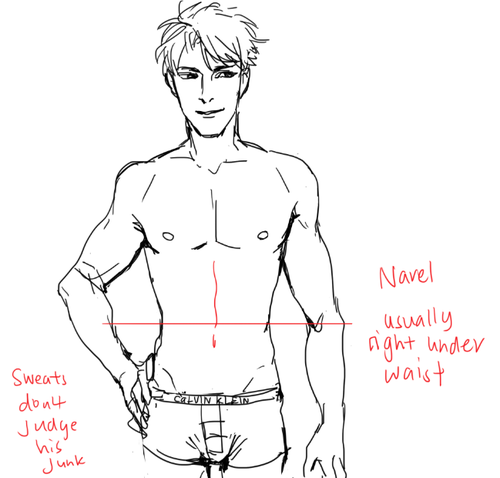
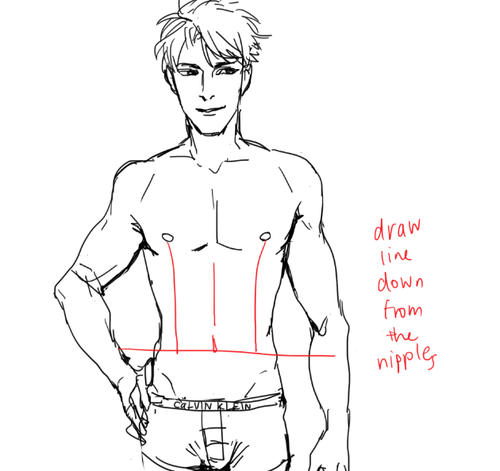
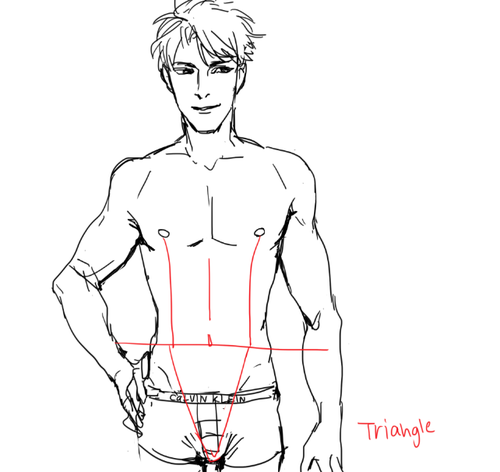
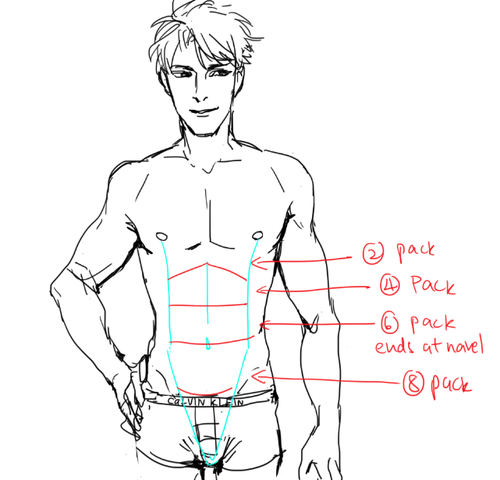
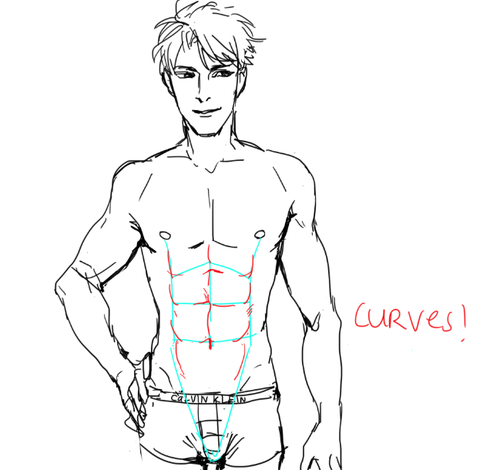
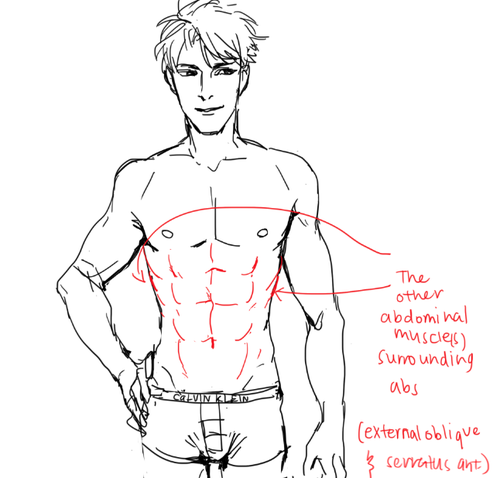
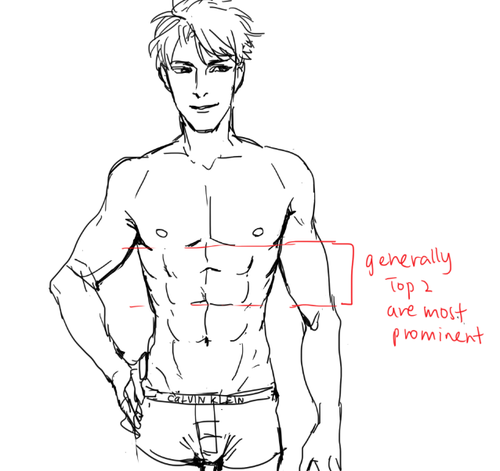
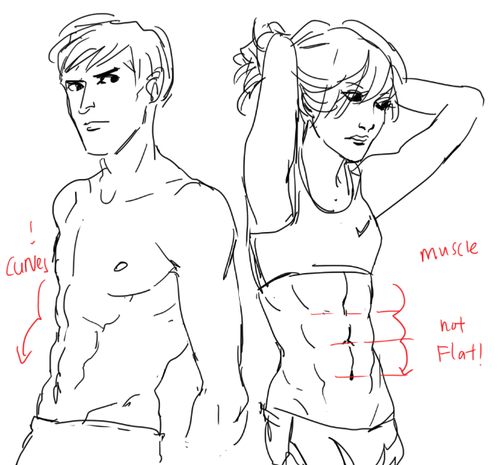
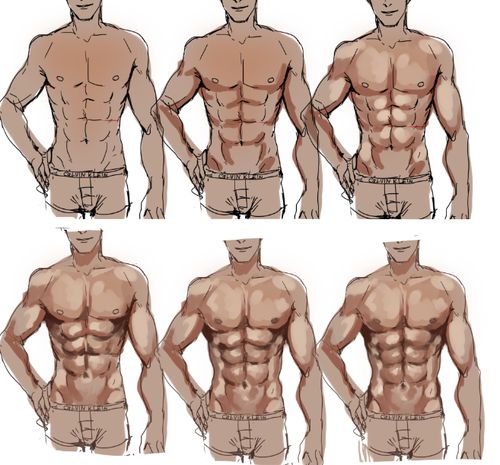
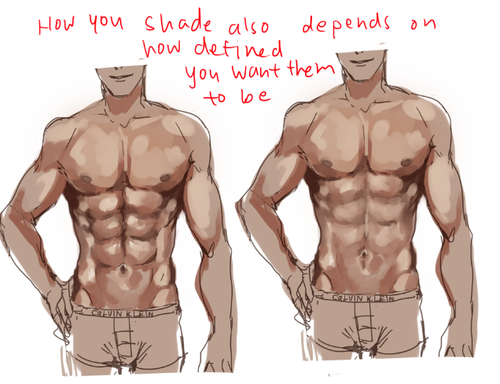
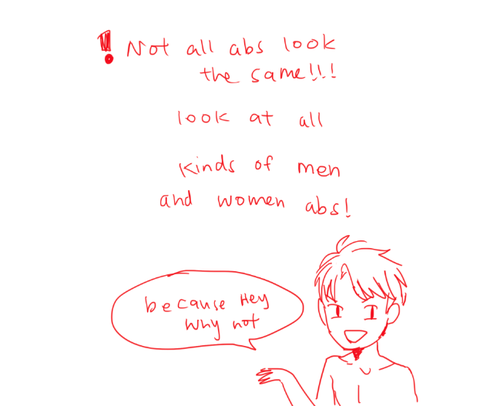
I STILL TAKE A LONG TIME TO DRAW OK looking abs HHahA SOBS AND LIES DOWN but yeah!! GO LOOK AND Some real life abs i promise you it’ll be ten times more helpful than my crude doodles!!
PLS TAKE THIS WITH A GRAIN OF ASALT AND Hope this helps u out a little!!








Upon request someone asked for an anatomy tutorial! I kept it fairly general but if anyone wants something more specific, I’m happy to make a more of them :D
Hi Fer! I simply love your blog and tutorials so much, but I was wondering on how you draw masculine bodies? My drawings have been female and slender men, and when I try... it just doesn't look right. So any tips can be really helpful because I want to try and draw different body shapes. Thank you so much! <3
easiest thing is probably to widen the shoulders and up the muscle mass! it really helps to study anatomy so you know which areas to exaggerate. a more muscular/masculine person will have a more defined sternocleidomastoid (in blue) and bigger traps (green); basically a thicker neck. playing with the shoulder to hip ratio will help as well. i guess if you want a super manly man just make him look like a dorito


Your art is amazing in all aspects! It's very inspiring! My sister and I both adore your Morrowind drawings especially.
However one thing about your art which has left me in awe is how 3 dimensional it is. "It's like you can hold them" as my sister says.
I've been trying to improve this aspect of my drawing but it's very overwhelming. I don't know what to do and what to learn. Any tips or advice in this regard would be greatly appreciated. Like what do I even learn? Anatomy? Perspective? Shape design?
Thank you very much💖
AHHHH this is such a kind thing to say, thank you so much ;; ❤️ i don't know what to say,, but i'll try my best to explain how i go about drawing!!
from my perspective, what really helps develop a sense of structure and three-dimensionality is breaking shapes down to simplified forms, take this maav sketch as an example:


breaking down objects into cylinder-like and rouded shapes provides a good visualization of volume and how an object moves and rotates in a three dimensional space! so yes, you were right!! structurization and perspective are crucial to learn along with anatomy. here's how i like to do it:

making grid-like structure studies like these helps me with shading and rendering later - think of it as some kind of a preview which shows you where exactly will the volumes intersect, curve, bend etc i hope i was able to answer your question and best of luck in your drawing!! much love :) 💖💖
-
 coldcage liked this · 1 month ago
coldcage liked this · 1 month ago -
 maycit0 liked this · 2 months ago
maycit0 liked this · 2 months ago -
 nessaillus liked this · 2 months ago
nessaillus liked this · 2 months ago -
 ispyatobert liked this · 2 months ago
ispyatobert liked this · 2 months ago -
 the-awesomeness-of-randomness liked this · 2 months ago
the-awesomeness-of-randomness liked this · 2 months ago -
 cosmiclv reblogged this · 2 months ago
cosmiclv reblogged this · 2 months ago -
 reignlycan liked this · 3 months ago
reignlycan liked this · 3 months ago -
 tobysbadhorns liked this · 3 months ago
tobysbadhorns liked this · 3 months ago -
 benchaplins liked this · 3 months ago
benchaplins liked this · 3 months ago -
 adanmwere liked this · 3 months ago
adanmwere liked this · 3 months ago -
 mkhx liked this · 4 months ago
mkhx liked this · 4 months ago -
 coffee-or-murder reblogged this · 4 months ago
coffee-or-murder reblogged this · 4 months ago -
 memetrashmom reblogged this · 4 months ago
memetrashmom reblogged this · 4 months ago -
 memetrashmom liked this · 4 months ago
memetrashmom liked this · 4 months ago -
 nightingalesmelody liked this · 4 months ago
nightingalesmelody liked this · 4 months ago -
 corporal-ravioli reblogged this · 4 months ago
corporal-ravioli reblogged this · 4 months ago -
 m3laini3sdr3am liked this · 4 months ago
m3laini3sdr3am liked this · 4 months ago -
 newdaysinspired liked this · 4 months ago
newdaysinspired liked this · 4 months ago -
 fries-victor liked this · 4 months ago
fries-victor liked this · 4 months ago -
 pinkasketch liked this · 5 months ago
pinkasketch liked this · 5 months ago -
 maximummmph liked this · 5 months ago
maximummmph liked this · 5 months ago -
 notforurefs reblogged this · 5 months ago
notforurefs reblogged this · 5 months ago -
 anakinsscars liked this · 5 months ago
anakinsscars liked this · 5 months ago -
 wolvarian204 liked this · 6 months ago
wolvarian204 liked this · 6 months ago -
 roseybloodlust reblogged this · 6 months ago
roseybloodlust reblogged this · 6 months ago -
 cuttote reblogged this · 6 months ago
cuttote reblogged this · 6 months ago -
 ungato-con-internet liked this · 6 months ago
ungato-con-internet liked this · 6 months ago -
 39fuwas liked this · 6 months ago
39fuwas liked this · 6 months ago -
 cremebrulee-69 reblogged this · 6 months ago
cremebrulee-69 reblogged this · 6 months ago -
 draculas-daughter29 liked this · 7 months ago
draculas-daughter29 liked this · 7 months ago -
 the-letter-horror-lover liked this · 7 months ago
the-letter-horror-lover liked this · 7 months ago -
 sea-adhesiveness537 reblogged this · 7 months ago
sea-adhesiveness537 reblogged this · 7 months ago -
 sea-adhesiveness537 liked this · 7 months ago
sea-adhesiveness537 liked this · 7 months ago -
 mayereka liked this · 7 months ago
mayereka liked this · 7 months ago -
 silver-maknae liked this · 7 months ago
silver-maknae liked this · 7 months ago -
 quantumlibrariansybillion reblogged this · 7 months ago
quantumlibrariansybillion reblogged this · 7 months ago -
 quantumlibrariansybillion liked this · 7 months ago
quantumlibrariansybillion liked this · 7 months ago -
 liamins liked this · 7 months ago
liamins liked this · 7 months ago -
 tytoalbion liked this · 7 months ago
tytoalbion liked this · 7 months ago -
 syrupmancer reblogged this · 7 months ago
syrupmancer reblogged this · 7 months ago -
 ottobooty liked this · 7 months ago
ottobooty liked this · 7 months ago -
 buttercookies4lyfe liked this · 7 months ago
buttercookies4lyfe liked this · 7 months ago -
 that-cameo liked this · 7 months ago
that-cameo liked this · 7 months ago -
 bluethepenguin reblogged this · 8 months ago
bluethepenguin reblogged this · 8 months ago -
 pizzawizardladysblog liked this · 8 months ago
pizzawizardladysblog liked this · 8 months ago -
 crierofirony liked this · 8 months ago
crierofirony liked this · 8 months ago